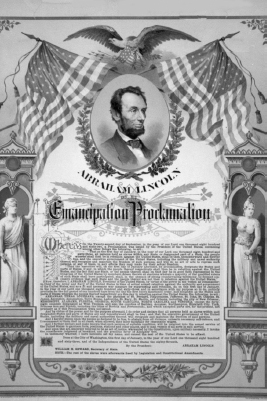Abraham LincolnPresidency |
What was the Emancipation Proclamation? |
The Emancipation Proclamation refers to an executive order issued by President Lincoln in September 1862, announcing his intention to free the slaves from states that had seceded from the Union. It also refers to the official January 1863 order that listed several states in which the proclamation applied. Lincoln waited to issue the Proclamation until the Union army made a strong showing in battle. After the Union army performed well at the bloody Battle of Antietam, Lincoln made the pronouncement. One effect of the ruling was that it allowed African Americans to join the Union army. In the words of George McGovern in his biography of Lincoln, it also represented “the beginning of the end of slavery in the United States” and “changed the whole nature of the war.” This act earned Lincoln the nickname “The Great Emancipator.”

An 1888 reproduction of the text of Lincoln’s “Emancipation Proclamation.”
